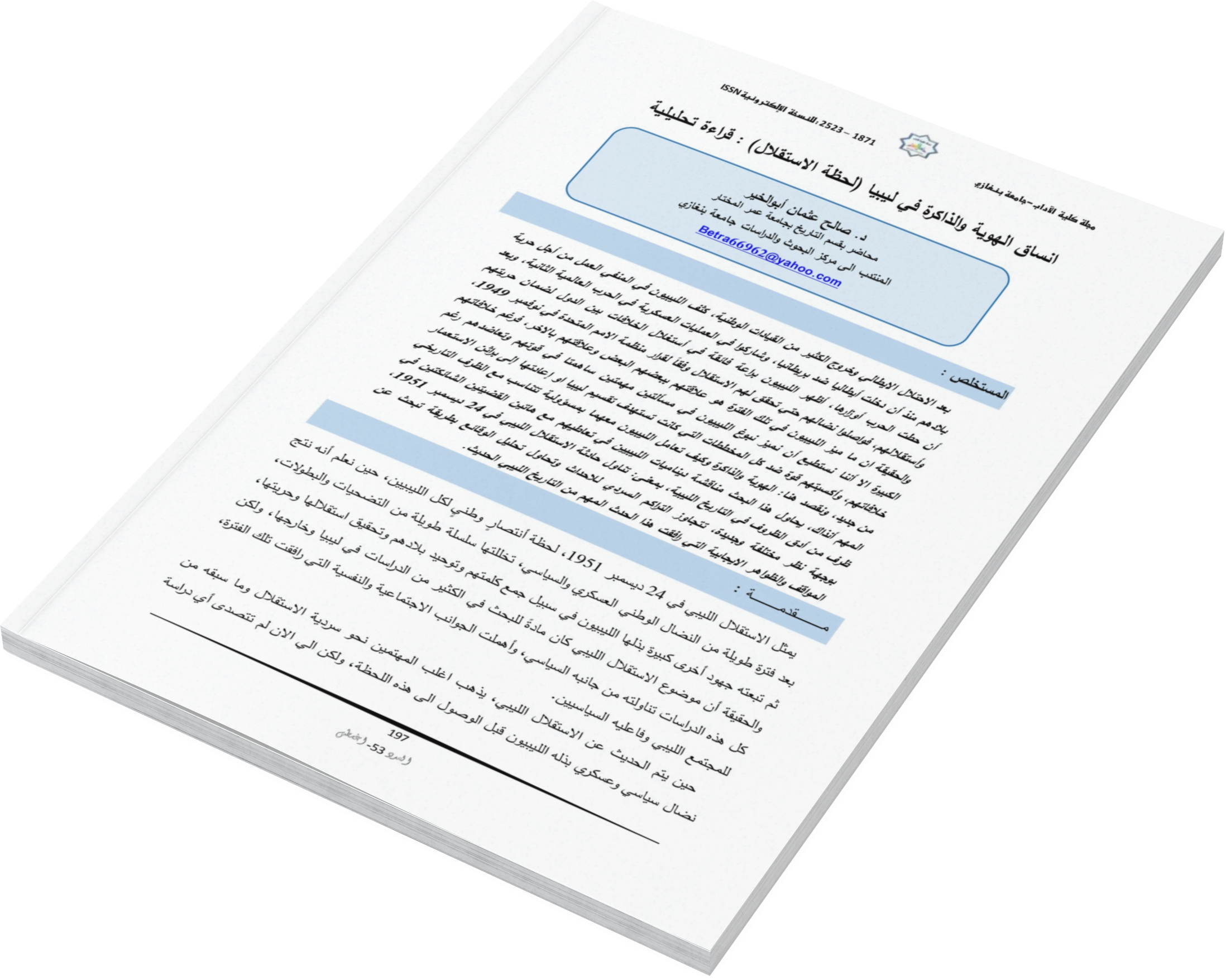انساق الهوية والذاكرة في ليبيا (لحظة الاستقلال) : قراءة تحليلية
DOI:
https://doi.org/10.37376/jofoa.vi53.6512الملخص
بعد الاحتلال الايطالي وخروج الكثير من القيادات الوطنية، كثف الليبيون في المنفي العمل من أجل حرية بلادهم منذ أن دخلت أيطاليا ضد بريطانيا، وشاركوا في العمليات العسكرية في الحرب العالمية الثانية، وبعد أن حطت الحرب أوزارها، أظهر الليبيون براعة فائقة في أستغلال الخلافات بين الدول لضمان حريتهم وأستقلالهم، فواصلوا نضالهم حتي تحقق لهم الاستقلال وفقاً لقرار منظمة الامم المتحدة في نوفمبر 1949، والحقيقة ان ما ميز الليبيون في تلك الفترة هو علاقتهم ببعضهم البعض وعلاقتهم بالاخر، فرغم خلافاتهم الكبيرة الا أننا نستطيع أن نميز نبوغ الليبيون في مسألتين مهمتين ساهمتا في قوتهم وتعاضدهم رغم خلافاتهم، وأكسبتهم قوة ضد كل المخططات التي كانت تستهدف تقسيم ليبيا او إعادتها إلى براثن الاستعمار من جديد، ونقصد هنا: الهوية والذاكرة وكيف تعامل الليبيون معهما بمسؤولية تتناسب مع الظرف التاريخي المهم أنذاك، يحاول هذا البحث مناقشة ديناميات الليبيين في تعاطيهم مع هاتين القضيتين الشائكتين في ظرف من أدق الظروف في التاريخ الليبية، بمعنى: تناول حادثة الاستقلال الليبي في 24 ديسمبر 1951، بوجهة نظر مختلفة وجديدة، تتجاوز التراكم السردي للاحداث وتحاول تحليل الوقائع بطريقة تبحث عن المواقف والظواهر الايجابية التي رافقت هذا الحدث المهم من التاريخ الليبي الحديث
التنزيلات
المراجع
After the Italian occupation and the departure of many national leaders, the Libyans in exile
intensified their work for the freedom of their country since Italy entered the war against
Britain, and they participated in military operations in World War II. After the war ended,
the Libyans showed great ingenuity in exploiting the differences between countries to ensure
their freedom and independence. They continued their struggle until independence was
achieved for them in accordance with the decision of the United Nations in November 1949.
The truth is that what distinguished the Libyans during that period was their relationship
with each other and their relationship with the other, despite their great differences, we can
distinguish the brilliance of the Libyans in two important issues that contributed to their
strength their solidarity despite their differences, and gave them strength against all plans
that were aimed at dividing Libya or returning it to the clutches of colonialism again, and
here we mean: identity and memory and how the Libyans dealt with them with a
responsibility commensurate with the important historical circumstance at the time.
This research attempts to discuss the dynamics of the Libyans in their dealings with these
two thorny issues in one of the most critical circumstances in Libyan history, i.e., dealing
with the Libyan independence incident on December 24, 1951, with a different and new point
of view that goes beyond the narrative accumulation of events and tries to analyze the facts
in a way that searches for the positive attitudes and phenomena that accompanied this
important event in modern Libyan history.

التنزيلات
منشور
كيفية الاقتباس
إصدار
القسم
الرخصة
الحقوق الفكرية (c) 2024 مجلة كلية الاداب

هذا العمل مرخص بموجب Creative Commons Attribution-NonCommercial-NoDerivatives 4.0 International License.




